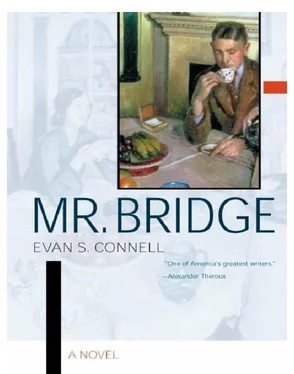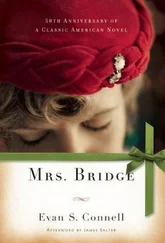During their five days in London he realized that he was searching for the man — in the hotel lobby, on the street, in restaurants, art galleries, and theaters. If he had encountered the stranger he would not have spoken, nor offered the slightest sign of recognition, yet all the while they were in London he found himself hunting for that face.
They spent their first evening in Paris with a young art student from Kansas City named Morgan Hager whose parents had informed him that Mr. and Mrs. Bridge were touring Europe. He therefore was expected to entertain them, if they wished to be entertained. Hager called the hotel, suggested an aperitif, and volunteered to come by for them in a taxi. Mr. Bridge, suspecting that Hager might be existing on very little money, told him the taxi was unnecessary, and they arranged to meet at a sidewalk cafe called Le Petit Lapin.
Here, after a second aperitif, Mr. Bridge expressed a desire to see something of the Bohemian life. Hager thought this over. He scratched his head without removing his beret, he plucked at his beard, and finally he suggested they have dinner at a restaurant called Henri’s on Montparnasse. Artists and models ate there.
This sounded fine. Mr. Bridge paid for the drinks and they started up the boulevard in the direction of Montparnasse.
They walked past the Comédie Française, they walked around the Luxembourg Gardens, crossed Raspail, went up one alley and down another, and eventually, having walked for more than half an hour, they arrived at Henri’s. It was extremely small, with sawdust on the floor, very dirty and very crowded.
For various reasons this meal was memorable. Mrs. Bridge was unable to cut the beefsteak without help, the wine resembled cherry soda with flecks of cork floating about on the surface, the bread was like stone, one of their neighbors, whom Hager introduced as Claude, had not bathed in a month or two, and Claude discovered a spider in his salad, although this did not trouble him very much. Still, as Hager promised, it was something of the Bohemian life, and the bill for three came to less than coffee and croissants at their hotel on the Champs Elysées, a fact which Mr. Bridge did not intend to forget.
Yet what made this experience memorable for him was neither the execrable food, the dirtiness, the extraordinary customers, nor the remarkable price, but a mention of the fabulous city of Petra, whose intricately carved cliffs echoed the tinkling bells of camel caravans a thousand years before the birth of Marco Polo. He paused with a slice of tomato in mid-air and began to recite: “ ‘It seems no work of man’s creative hand by labor wrought as wavering fancy planned, but from the rock as if by magic grown, eternal, silent, beautiful, alone!’ ”
“My word!” Mrs. Bridge exclaimed. “What was that? — if you please.”
“ ‘Match me such marvel save in Eastern clime, a rose-red city half as old as time.’ That was by John William Burgon. It was quite a celebrated bit of verse during my school days. As a matter of fact, I believe it won some sort of important prize. We were required to commit it to memory. So you have been there, have you?” he said to Hager. “I was under the the impression the place was virtually inaccessible.”
“I must admit I’m altogether at a loss,” Mrs. Bridge said. “What on earth are you talking about?”
“Morgan? Would you care to answer?”
Hager said, “You probably know more about it than I do. You answer.”
Mr. Bridge laughed. “If you have been there you should be the authority. However, I suspect I might be able to answer the question. I became quite fascinated with Petra as a consequence of memorizing the poem. The poem, of course, consists of a number of stanzas, and there was a day I was able to quote it in its entirety. I doubt if I could do so now. At any rate, as I say, I became quite taken with Petra in consequence and visited the library in order to find out more about it. Let me see what I can recall.”
He cleared his throat. “Petra was constructed — or I should say, carved out of the cliff — by Nabataean Arabs during a period of some five centuries commencing about 300 B.C. It is located approximately two hundred miles south of the Dead Sea. For a number of centuries it was a wealthy and celebrated city with a vast caravan trade, but declined in importance with the rise of Palmyra. The Nabataeans were astute traders and competent engineers, digging wells, building cisterns, and terracing arid land so that the surrounding desert would produce sufficient grain, fruit, and vegetables to feed the people. Their kingdom — if such it may be called — at one time extended as far north as Damascus. I seem to recall that a Nabataean governor ruled Damascus when St. Paul was converted on the Damascus road. In any event, Petra was annexed as a Roman province and later was conquered by Moslems and still later by Crusaders. It was then abandoned and ‘lost’ to the world. Even the knowledge of its existence was lost until a Swiss explorer, whose name escapes me at the moment, discovered it early in the nineteenth century. Now it is considered one of the world’s most rewarding and adventurous travel experiences. The ornately carved facade of a building referred to as the ‘Treasury’ is reputed to be a never-to-be-forgotten sight. And I believe this pretty well summarizes my skimpy knowledge of Petra. Morgan, I’m sure you must have a great deal to tell us about it. We certainly would be interested in hearing. I have, in a manner of speaking, often dreamed of visiting Petra.”
Hager looked uncomfortable.
Mr. Bridge went on: “The encyclopedia states that the rock is stratified in a magnificent profusion of color — the famous rose color, as well as crimson, purple, saffron, and various other hues intermingled with black and white. Now tell us, is it as beautiful as the encyclopedia would have us believe?”
Hager said it was, and once more scratched his head.
“So you’ve been to Petra, have you!” Mr. Bridge remarked as though reluctant to believe it. “The rose-red city half as old as time — and you have been there!” Gazing at Morgan Hager he wondered how an insignificant, fatuous boy had managed to do what he had merely dreamed of doing.
111 Good Night, Good Night!
As they were leaving Henri’s restaurant Hager pointed to a hotel further down the street, and putting on a droll face he said it was a very famous hotel. Mrs. Bridge promptly wished to know why. Because, he announced with a theatrical gesture, Mademoiselle Susy used to live in that hotel. Mrs. Bridge confessed she had not heard of Mademoiselle Susy. Hager appeared rather startled; he glanced uncertainly at Mr. Bridge, but finding no comfort there, in fact no response whatever, he looked again at Mrs. Bridge and opened his mouth to explain, but changed his mind and suggested they wander toward St. Germain des Prés for a cognac. Mrs. Bridge, however, would have none of this, not until she heard the story of Mademoiselle Susy. Hager pulled off his beret and turned it inside out as though he expected to find the answer inside, and then he put it on again.
Mr. Bridge, studying him with frank curiosity, guessed that the reference to the hotel and the woman was intended as some sort of a joke. Probably she had been a notorious prostitute who conducted her business there. But the joke failed because neither of them had heard of her, so Hager had talked himself into a cul-de-sac.
“A cognac,” he said, “sounds to me like an excellent idea, Morgan.”
Mrs. Bridge suspected something was being kept from her; she repeated that she was not walking one more step until she had heard all about Mademoiselle Susy.
Читать дальше












